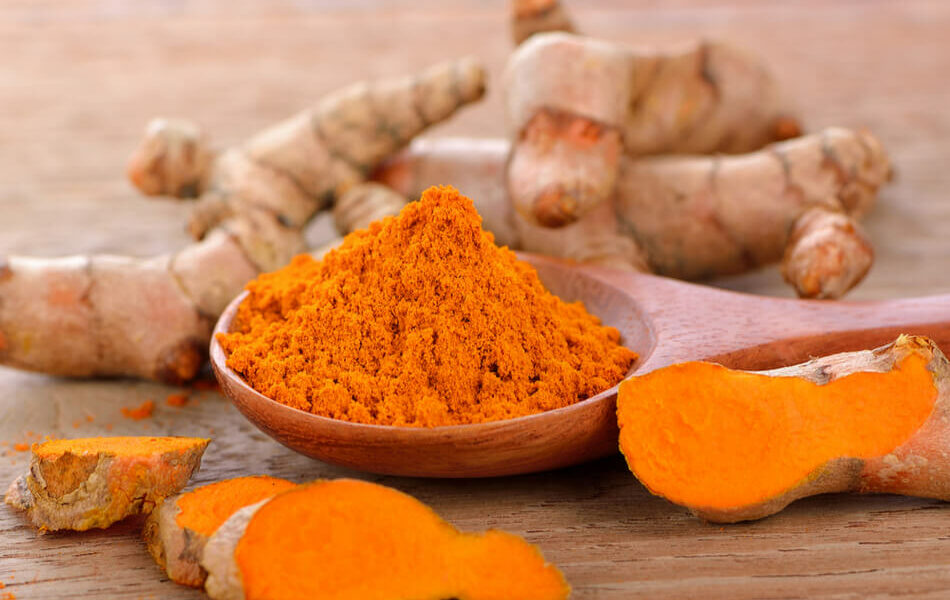Turmeric for Weight Loss: Is There Truth in It?
The golden spice provides numerous benefits to human health and may even play a role in weight loss. Here we discuss turmeric as a booster for your weight loss journey.

Turmeric, the flowering plant known as the golden spice, is a potent herb popular in cooking, cosmetics, and medicine.
You can recognize its distinctive yellow color and aromatic flavor in Indian cuisine as the ingredient is frequently used in many curries and other savory plates. You can even enjoy turmeric tea and lattes.
Its powerful antioxidant and anti-inflammatory properties deliver a range of benefits to human health, potentially improving heart and brain health and protecting against certain cancers. More recently, it is thought to aid weight loss.
Weight gain is difficult to combat. A natural product could be the answer if you want to boost a healthy diet to lose weight without turning to dietary supplements.
Keep reading as we talk about turmeric and weight loss.
Turmeric for Weight Loss – Is It Good?
Turmeric for weight loss is a promising theory due to the antioxidant and anti-inflammatory properties of its primary active compound, curcumin. These properties may help combat chronic inflammation disorders that hinder weight loss, such as diabetes, metabolic syndrome, and obesity.
In reducing these particular inflammatory markers, turmeric may assist the body’s ability to shed excess weight. Plus, rodent studies have shown turmeric extract to suppress fat tissue growth.
However, more human research is required to determine turmeric’s role in your weight loss efforts.
What Is Turmeric?
Turmeric is a spice that comes from the Curcuma longa plant root. It is a member of the ginger family native to Southeast Asia, primarily grown in India.
It is used as a culinary ingredient most prominent in curries and teas. Its key component, curcumin, gives turmeric its rich yellow color. The healthful effects of turmeric can usually be attributed to curcumin.
The turmeric skin is brown, while the inner flesh is bright orange. It provides an earthy, mildly spiced flavor. You can buy turmeric from your local grocery store in its raw form, as turmeric powder, or in turmeric supplements.
Outside of the kitchen, it is known for its medicinal properties historically used in traditional Eastern Asian medicine, like Ayurveda.
Due to its unique health benefits, turmeric is used to treat wounds, infections, allergies, inflammation, liver disease, and depression. It might also help to regrow hair faster.
Turmeric Benefits for Weight Loss
There are links to suggest turmeric may enhance body fat reduction. So, if you’re having difficulty losing weight, turmeric can potentially help. Here’s why.
#1 Anti-inflammatory effects
The anti-inflammatory properties of turmeric, essentially curcumin, are perhaps its most significant contributor to weight loss efforts.
Studies have shown curcumin to suppress inflammation. Chronic inflammation can drive many chronic diseases, including heart disease, diabetes, obesity, metabolic syndrome, and cancer. In fighting inflammation, curcumin can help reduce high blood pressure, high blood sugar, and cholesterol levels.
In randomized controlled trials, curcumin intake in patients with metabolic syndrome and other related disorders showed significant reductions in body mass index, body weight, waist circumference, and the hormone leptin.
Leptin is the hormone responsible for appetite regulation and fat storage.
The same study showed an increase in hormone adiponectin levels, the hormone responsible for regulating the metabolism and that helps protect against insulin resistance.
In obesity, the hormones are disturbed, causing dysfunction in adipose tissue. In adapting hormone levels, patients may benefit from improved metabolic health.
#2 Powerful antioxidant
Turmeric has antioxidant properties that neutralize free radicals and protect the body from cellular damage.
The properties of antioxidant-rich foods within a balanced diet can help you lose weight and support weight management.
Downsides of Using Turmeric for weight loss
As with most things, turmeric consumption has a few downsides. Here are some problems associated with the spice.
The use of turmeric may trigger a possible iron deficiency. Turmeric is known to prevent iron absorption by 20–90% in humans.
Turmeric and other spices contain polyphenolic compounds that can inhibit iron absorption by forming iron complexes in the intestine.
Excessive intake of turmeric can affect the kidneys, increasing the risk of kidney stones in predisposed persons due to oxalates that can significantly increase urinary oxalate levels.
High doses may cause mild digestive distress in some people, including bloating, indigestion, nausea, and diarrhea.
Can Turmeric Burn Belly Fat?
As turmeric can potentially help you lose weight, it may effectively burn excess fat around the abdomen.
Some people believe that you can reduce belly fat if you drink turmeric tea. This may be because turmeric tea can increase bile production, a digestive juice in the stomach that emulsifies dietary fat to be broken down by digestive enzymes.
How to Use Turmeric for Weight Loss
Turmeric is versatile. There are many ways to incorporate spice into a healthy diet that promotes weight loss.
It’s easiest to use turmeric in powder form. This powder works excellent in beverages. Turmeric tea is incredibly trendy, or you can make turmeric ginger tea, which includes black pepper and cinnamon powder for an extra kick.
If you enjoy Indian cuisine, this is a crucial ingredient for your favorite curry dishes, paneer, soups, and lentil dishes. You can even add a little ground turmeric to food alongside black pepper, which activates curcumin absorption.
Curcumin supplements contain a higher dose if you want to optimize the benefits of turmeric within your diet. However, you shouldn’t take large amounts of turmeric for extended periods as it may be harmful.
Remember, the likes of turmeric tea and curcumin supplements do not guarantee weight loss. More research is required, but you can still enjoy turmeric’s many known benefits.
Who Should Not Use Turmeric?
Despite the many health benefits of turmeric, the common spice is not suitable for everyone. While safe for most healthy adults, turmeric and curcumin supplementation is best avoided by the following groups:
Those with an iron deficiency: Turmeric can inhibit the body’s ability to absorb iron.
Gallbladder problems: Turmeric may worsen issues with the gallbladder, triggering abdominal pain in those with gallstones.
Bleeding disorders: Turmeric can obstruct blood clotting, increasing the risk of bleeding and bruising. For this reason, it should also be avoided by those undergoing surgery. It is also a natural blood thinner that you should not combine with other blood-thinning medications.
Diabetes: Although the turmeric supplement may help stabilize blood sugar levels in people with type 2 diabetes, it may interact with diabetes medication causing low blood sugar.
Kidney stones: The significant amount of oxalates in turmeric link to an increased risk of kidney stones.
Pregnant and breastfeeding women: More studies are required to conclude the safety of turmeric for pregnant and breastfeeding women.
FAQs
A turmeric dosage between 500–2,000mg per day may yield potential weight loss benefits, although many turmeric supplements contain 150–250mg per serving.
It is unknown how much weight you can lose by taking turmeric as more human studies are required.
Drinking turmeric every day in moderate doses may improve your heart health, reduce your risk of cancer, and boost skin health, among other health benefits.
A Word From Nutritionist
The popular spice turmeric is rich in vitamin C, vitamin B6, and antioxidants. These characteristics make it a healthy addition to your lifestyle that can reduce the risk of chronic health conditions.
As part of a balanced diet, turmeric may aid the weight loss process by suppressing inflammation, providing antioxidant effects, and preventing insulin resistance.
While turmeric is well-known for its numerous health benefits, further study in the medical sciences is needed to prove the probable relationship between turmeric consumption and weight loss.
It’s important to remember that a single product alone will not magically make you lose weight. Weight loss essentially boils down to creating a calorie deficit, where you reduce your calorie intake to below your daily energy expenditure.
Leading a healthy lifestyle that includes regular exercise and a nutritious diet are clinically proven methods for shedding the pounds.
Conclusion
Turmeric has some attributes that may assist you in losing weight. Potential fat loss can mainly be attributed to curcumin’s anti-inflammatory and antioxidant properties. Even without fat loss, turmeric provides a healthy boost to the immune system, aiding heart and brain health.
Before trying curcumin supplementation for fat loss, talk to a certified medical professional for advice as it may incur adverse side effects.

















































 Select your language:
Select your language: 








